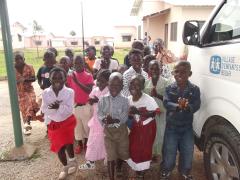Children are most vulnerable and their future is endangered

Bouar is located near the Cameroonian border and has a population of roughly 100,000. It is the capital of the Nana-Mamberé prefecture.
The region has been repeatedly affected by rebel attacks in recent years and Bouar has received a great number of displaced people from the north of the country. This has led to very difficult social circumstances, especially for children.
Poverty, malnutrition and a lack of education are common. Living conditions are substandard, and basic services are often not available. Even the water supply is unreliable, which can lead to the spreading of waterborne diseases such as typhoid fever and parasitic infections.
Support for the whole family for long-term stability
SOS Children’s Villages began its work in Bouar in 2007 with the implementation of an SOS Family Strengthening Programme. The need for support was great, as there were many children living in poverty, many who had lost one or both parents, children living with elderly, sick or disabled parents, as well as children who had become the head of the family. Such children are generally unaware of their rights and struggle to survive. Often, they do not even have a birth certificate, which makes access to social services and education very difficult.
The SOS Family Strengthening Programme identifies vulnerable families and provides assistance, for example by ensuring children and young people can go to school or vocational training, as well as providing literacy training to parents. SOS co-workers visit homes and provide counselling and education on HIV/AIDS and general health matters. In addition, dozens of families have received micro-loans in order to start up their own income-generating ventures.
What we do in Bouar
The SOS Medical Centre here in Bouar can see up to 12,000 patients a year and provides basic medical care, information on preventive measures and counselling to people from the region. We make sure the children have all essential vaccinations and we offer information on family planning to the young adults. We provide anti-retroviral treatment to those affected by HIV, especially to prevent mother-to-child transmission during pregnancy. A pedagogue and a social worker are also available to serve the needs of the local population.
For children from the region who are no longer able to live with their parents, twelve SOS families can provide a loving home for up to 120 children. In each family, the children live with their brothers and sisters, affectionately cared for by their SOS mother.
The children attend the SOS Kindergarten together with children from the neighbourhood, which ensures that they are integrated into the local community from a young age. They then go on to complete their primary education at the SOS school here in Bouar, which is attended by 210 pupils.